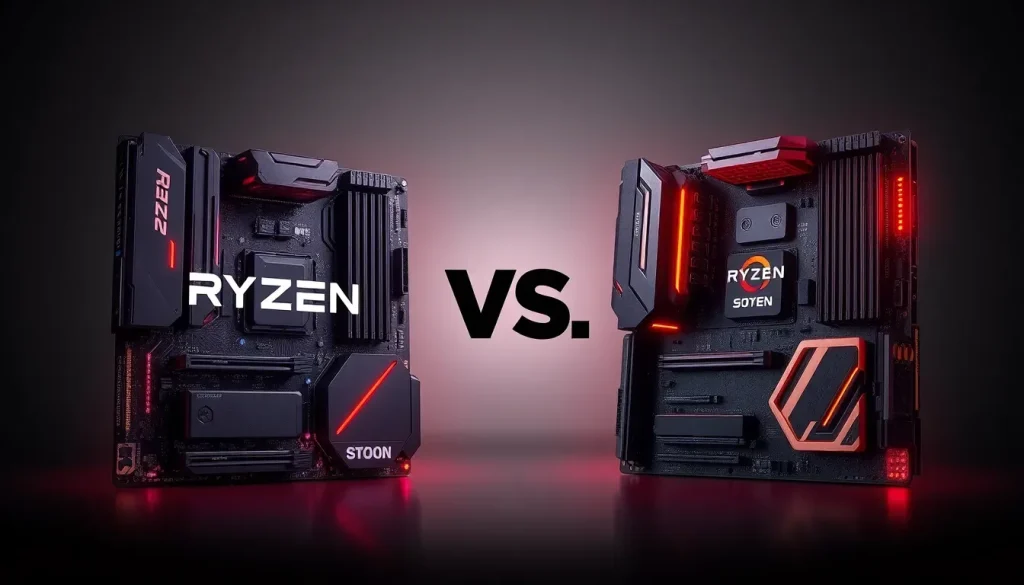Ryzen 9000 vs ASRock comparison and insights for clear decision

The recent launch of the Ryzen 9000 series, particularly the 9800X3D, has been marred by significant reports of failures that have sparked concern among users and reviewers alike. These issues have led to widespread discussions in the tech community, especially focusing on the compatibility of these processors with ASRock motherboards. Understanding the underlying reasons for these failures and the overall performance of the Ryzen 9000 series is crucial for consumers and enthusiasts looking to make informed decisions.
Understanding the Ryzen 9000 Series Failures
Since their introduction, the Ryzen 9000 series has garnered attention not only for its advanced architecture but also for its troubling reliability issues. The most notable problem has been the reports of cracked processors, particularly when paired with ASRock motherboards. Initial investigations pointed to potential flaws in the hardware and compatibility issues, igniting a wave of speculation and concern among users.
ASRock, the motherboard manufacturer, initially shifted the blame to AMD, claiming that the issues stemmed from the Precision Boost Overdrive (PBO) feature. However, they later released several BIOS updates in an attempt to rectify the situation. Despite these efforts, the issues have persisted, prompting further scrutiny and investigation from various tech outlets.
Investigation Insights: Voltage Spikes and Testing Methods
As part of an investigation into the failures, Gamers Nexus conducted extensive testing on ASRock motherboards, specifically the B650 Steel Legend model. This testing aimed to compare two BIOS versions: the older version 3.15 and the more recent version 3.25, over a span of 200 hours. The goal was to identify any significant differences that could explain the processor failures.
During this rigorous testing, several observations were made regarding voltage behavior during different operational modes. The key findings included:
- Voltage Variations: While voltage spikes were noted in standby and hibernation modes, they were not significantly alarming.
- TDC and EDC Comparison: No substantial differences were observed between the Thermal Design Current (TDC) and Electrical Design Current (EDC).
- PPT Changes: The Power Package Tracking (PPT) limit saw a dramatic reduction from 1000W to 270W.
- Standby Voltage Increase: Output voltages during standby rose from 1.02V to 1.19V, although this change was not considered catastrophic.
- BIOS Improvements: A later update, version 3.40, incorporated a Fixed SoC_Voltage function, which helped lower standby voltages by 0.07V.
Current Status of Ryzen 9000 and ASRock Motherboards
Despite the extensive testing and BIOS adjustments, the underlying cause of the Ryzen 9000 processor failures remains elusive. The investigation's outcome leaves many unanswered questions for users. It seems that the conditions leading to the failures are highly specific, but pinpointing the exact cause continues to be a challenge for both AMD and ASRock.
For consumers and gamers alike, the uncertainty surrounding the Ryzen 9000 series raises critical considerations:
- Compatibility: Users should carefully evaluate their motherboard choices and compatibility with the Ryzen 9000 series.
- Firmware Updates: Keeping firmware updated is essential to address potential bugs or issues that could arise.
- Monitoring Performance: Users are advised to monitor their system performance and watch for any irregularities.
The Broader Implications for AMD and Users
The ongoing issues with the Ryzen 9000 series also have broader implications for AMD's reputation in the market. Historically, AMD has made significant strides in the CPU space, often gaining a loyal customer base due to its innovative products and competitive pricing. However, a series of failures, especially concerning flagship products, can undermine consumer confidence.
Furthermore, the tech community is closely watching how AMD will respond to these challenges. Transparency in addressing these issues will be crucial in maintaining their standing within the industry. As issues like these unfold, users are encouraged to share their experiences and solutions in forums and communities, which can help others navigate potential pitfalls.
Community Reactions and Resources
The tech community has been actively discussing the Ryzen 9000 series failures on various platforms. Many users have shared their personal experiences, providing insights into how they managed or mitigated the issues. For those looking for more information or support, several resources are available:
- ASRock's Response to Ryzen 9000 Failures
- User Insights on Ryzen 9000 CPU Issues
- Video Analysis of ASRock Motherboards and Ryzen 9000
Final Thoughts on Ryzen 9000 Performance
As consumers weigh their options, the performance of the Ryzen 9000 series, particularly in gaming and productivity tasks, remains a key consideration. While the architecture promises significant advancements, the ongoing reliability issues could overshadow these benefits. Users looking to upgrade should consider the potential risks and stay informed about ongoing developments in both AMD's and ASRock's response to these challenges.
For a deeper understanding of the evolving situation, check out this video that explores the nuances surrounding the Ryzen 9000 series and its compatibility with ASRock motherboards:




Leave a Reply